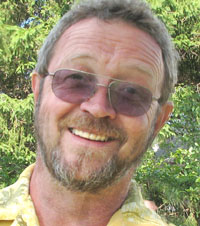News gives me the blues. I don’t hide my head in the sand because of it. I’m still a concerned citizen. I just don’t like what I’m hearing and reading.
Every news item, every trial, every confession, every outburst, every infraction gets chewed over for a thousand hours by a thousand pundits and broadcast over a thousand outlets. Within minutes everyone is an expert on the topic, based on their preferred spin, and fighting on Facebook or filling the car with commentary for the entire slow crawl across the Black Point Cutoff.
If I turn to humor as an escape, I get satire on every trial, confession, outburst and infraction. The Cooking Channel is still safe harbor.
Journalism has not died. It is alive, well and thriving. What is endangered is the role of the editor. The internet has no editors. Censors, maybe.
Harken back to pre-internet days. Most broadcast and print news sources had editorial staffs, proofreaders, fact checkers, and peer review professionals who would pour over every news submission with astute scrutiny and often send it back for rewrites. Publishers demanded it. Integrity was the bulwark of success in the news industry.
Back when we opened a newspaper or magazine, flipped on a car radio, or tuned into the nightly news, we listened with faith and trust that we were receiving the best information available. Skepticism wasn’t on our minds.
When we did hear of news spoofs, like Orson Welles “War of the Worlds” broadcast, it was an anomaly and funny. Walter Cronkite was living his legend.
Now, two 12-year-olds named Jimmy and Nikoli can anonymously design a professional website with doctored photos and concocted stories connecting anyone they don’t like to anything everybody hates. Then they can spread their links through the Tweetings of little birds that tell others, and post shares on shared media. Before long, the stories are perceived realities.
Reputable news agencies still have editors, and reviewers, and high standards. They publish news objectively with the public’s best interests in mind. However, everyone with a keyboard and a connection is a publisher. They blur the landscape. Their numbers and varied motives are colossal in comparison.
They lure with news many people very much want to believe: You’re being picked on. You deserve better. The less deserving are eating pie. We’ve identified your enemies for you.
The education, naivety, and maturity of the readers who subscribe to these questionable news sources are also part of the parcel. Too many folks were not taught, or did not learn, to ask, “Who picked these mushrooms?”
If George Orwell were alive today to see internet news, would his jaw drop, or would he nod his head?
Back in 1990s when the internet was being built into our campus classrooms, we soon found problems with student research assignments. Some were copy-paste plagiarized handoffs. That’s an intentional infraction with solid solutions. Other students, however, were including inaccurate and obscure references with sources cited, but not analyzed. One site demonized MLK. A search on Whois showed a supremacy group as the owners. A holocaust denial site Whois search hooked it to fanatical group. Whois isn’t much help anymore. People register their sites through parent companies like GoDaddy and stay unknown.
As educators, we saw the fake-news problem 25 years ago. We may have missed the magnitude. The internet has no editor. Our concerns were that a student might not understand the Holocaust or mitosis accurately. It’s doubtful any of us imagined that phony websites and fake news would someday threaten the very fabric of democratic societies around the world.
My news absorption hour comes at dawn, and then I avoid it for the rest of the day. I browse through my trusted sources. I follow local, state, national, and international headlines, diving in when interested. When a good recipe pops up, I pause and watch the video and try my darnedest to remember all the ingredients. If there’s a funny dog or cat video, I check that out, too. When I’m out of coffee, I’m out of news.
Susan likes afternoon television political news. We’re both lifelong newshounds. She just has more endurance than I. She likes to hear the analysis. I prefer silence, or Miles Davis.
If I stitch two notions together, I can credit my satiated news exposure to my new-found time in the garage that led to my interest in woodworking and finish. It’s the only room where I cannot hear the television. My new slab coffee table is a direct extension of my news weaning. That fits. No news, no coffee, no coffee, no news.
Nietzsche once wrote that believing truth is more important than appearance is simply morality bias. Let the pundits chew on those implications.
One question still lingers for me after reading about our current state of affairs, about trials and verdicts and flying televisions. Can one simply boil macaroni in milk, toss in some cheddar and butter and be done with it?
Steve Gibbs is a retired Benicia High School teacher who has written a column for The Herald since 1985.







If you boil the milk, it will curdle which will not be tasty. However, if you simmer the pasta in skim milk for about twice as long as you would with water, then add the cheese, it should be OK.
Liked the article on how to deal with the news by not dealing with it. Concur that fake news is rampant Personally, I ignore it as well as I can.
I do wonder, though, whether plagiarism today isn’t just an extension of what we all did (Baby Boomers) when we researched our grade school homework in the Encyclopedia Brittanica we all had. Granted, most of us stole from more than one article. Today it is just too easy to copy and paste-less likely to learn something by accident as well.